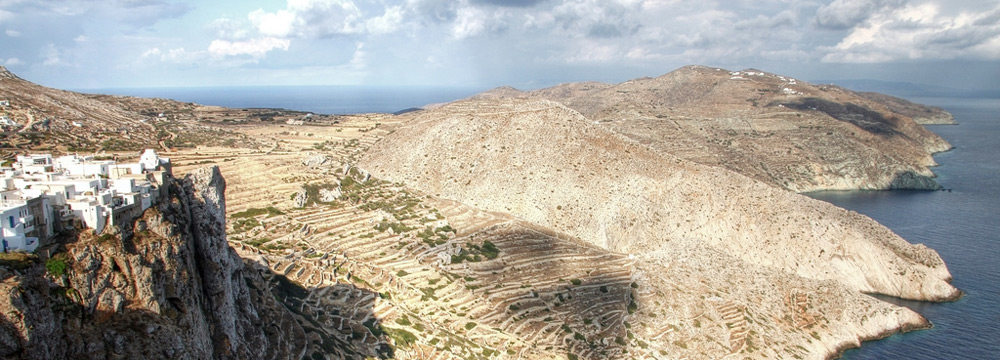The Hryssospilia cave, meaning “golden cave” in Greek, is a remarkable cave found at an altitude of approximately 10 meters above sea level on the hillside of mountain Palaiokastro. Situated on the eastern coast of the island Hryssospilia cave ,one of the biggest caves in Greece, is adorned with stalactites and stalagmites forming a throne-like perch along the cave’s long chamber.
The cave is considered an exceptional archeological site since it was used as a place for rites, mystique rituals and sacred ceremonies during the 4th century B.C. according to some archeological findings. It was also the ideal place to be used as a shelter during the Roman domination and a place for shepherds to water their flocks because of its natural spring and its secluded location.
Access to the cave is really difficult both from the land and sea. The excursion boats that go on daily island tours will stop at the cave’s entrance for a few minutes for travelers to take a quick glimpse and admire this spectacular natural formation.
Established by Marco Sanudo, the duke of Naxos during 1212, the castle of Folegandros is a medieval settlement created in order to protect the island’s population from enemies and pirate invasions.Still inhabited and well preserved the castle offers breathtaking views of the island and the surrounding Aegean Sea.
Within the settlement one can encounter several picturesque churches as well as the unique “monospita” houses which were single room houses built for entire families. The Castle is easily accessed on foot from the Hora of Folegandros.
• Kastello
Remains of a prehistoric settlement were found at the small picturesque rocky peninsula of Kastellos, situated on the northern side of the island. Some archeological findings are dated back to the Early Cycladic period.
• Palaiokastro
Located right above the church of Panagia in the Hora of Folegandros the site of Palaiokastro is a site of significant importance due to the remains of an ancient acropolis dating back to the Classic period and the Byzantine era.
• Hora
Considered to be one of the most picturesque and unspoiled settlements of the Cyclades island complex, Hhora is the capital town of Folegandros. Hora consists of two separate settlements, the old medieval settlement of Castle (Kastro in Greek) and the newer settlement of Horio. Representing the quintessence of the Cyclades, Hora is an authentic Cycladic town with narrow paved streets, whitewashed houses, scenic churches and consecutive squares. Many tourist facilities are available at Hora including lodgings, restaurants, cafes and bars as well as other tourist services and must see sights.
• Karavostasi harbor village
Karavostasi is the quiet scenic harbor village of Folegandros situated at approximately 2 km distance from Hora. It is surrounded by some of the most beautiful beaches of the island and it is lined up with taverns and cafes and filled with traditional Cycladic houses, picturesque lodgings and hotels.
• Ano Meria village
Only a few km away from Hora the picturesque village of Ano Meria is nuzzled amidst lush green fields. Visitors will be enchanted by its unraveling scenic beauty and its unspoiled character. It is worth while visiting the Laographic museum and tasting the local handmade pasta “matsata”.
• Livadi Village
Known for its stunningly beautiful golden sand beach the village of Livadi is a quiet agricultural settlement situated in the southeast of Hora.
• Agali Village
Amphitheatrically built over the bay of Vathy and only a few kilometers away from Hora, the name of Agali village means “embrace” in the Greek language. The beach of Agali is considered to be one of the best beaches on the island, therefore many visitors choose to go there for a swim or for a meal at one of the local beachside taverns. Swimming and sailing games and competitions are organized every August by the Nautical Association of Folegandros at Agali beach. The village of Agali offers some beautiful accommodation lodgings and it is located nearby the pristine beaches of Agios Nikolaos and Fira.
Situated at Ano Meria, the island’s Ecology and Folklore museum is actually a “themonia”, a bulding in formation of an original Folegandros farm of the 19thcentury. The museum consists of four buildings, old and more contemporary, featuring a collection of tools, utensils and furnishes as well as other exhibits.
A small threshing floor, a large basin, a small wine press, a traditional oil-press, an authentic wood oven, a wine cellar, a small vineyard and acres used for the cultivation of fruits and vegetables can be found all around the farm.
According to the myth on May 1st of 1790 18 boats of Algerian pirates reached the island of Folegandros and the island’s frightened residents begged for Virgin Mary’s protection. Then all of a sudden a strong wind blew and sank the ships without leaving any survivors. Thus on the 1st of May each year the church of Panagia is celebrated with a feast. The church can be reached from the Pounta square at Hora by following an uphill path.








 BACK TO LIST
BACK TO LIST